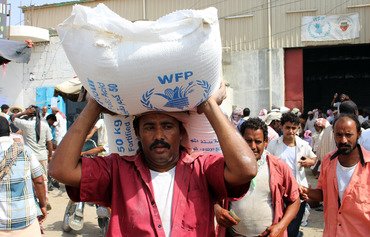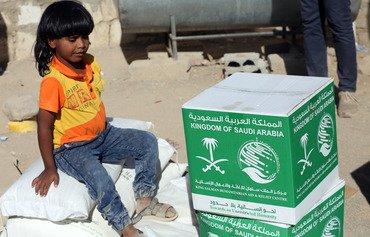Civil society organisations in Yemen's Shabwa province have been serving as critical intermediaries in the distribution of humanitarian aid provided by international organisations to the displaced population and those in need.
By using databases they have compiled, local organisations have been able to ensure much-needed aid reaches its intended recipients, said Shabwa province first deputy governor Mohammed Saleh bin Idyu.
"These organisations have conducted field surveys of the targeted segments at various times in the past that now help them shorten the time and lower the cost required to reach those targeted for this aid," he told Al-Mashareq.
These organisations also co-ordinate with local authorities to implement projects in Shabwa province that have received funding from donor countries, he said.
'Commendable efforts'
"Humanitarian aid that reaches the province from concerned relief parties has served a large segment of the low-income population affected by the war," bin Idyu said.
Though the aid provided is not sufficient to meet the needs of the population, the efforts to provide and distribute it are "commendable", he added.
"Civil society organisations are making laudable efforts, both in terms of raising financial and in-kind assistance for those in need and by playing the role of the intermediary in the case of aid provided by international relief and humanitarian organisations," he said.
The local authority hopes to see an expanded role for these organisations in the future, he said, in which they will provide people with "services that are not related to their daily sustenance".
This is because this type of assistance "ends as soon as the aid is consumed", he explained. "We look forward to them providing assistance in the form of long-term development projects that serve a large a segment of the population."
This would include projects in the healthcare and education sectors, he said, as well as the provision or repair of electricity, sanitation, roads and other infrastructure destroyed in the war with the Houthis (Ansarallah).
Prominent donor organisations include the King Salman Centre, the UAE Red Crescent, the Kuwait Fund for Arab Economic Development, the UN Office for the Co-ordination of Humanitarian Affairs (OCHA), UNICEF and the World Health Organisation (WHO), among others, he said.
Distribution of food aid
"Local civil society organisations have gained considerable experience in the implementation of the work and conduct of surveys," said Nasser al-Qaffan, a consultant for local and international organisations operating in Shabwa.
This has encouraged international organisations to entrust them with implementing their various humanitarian relief projects, he told Al-Mashareq.
Province-wide relief projects are being carried out by Damir, al-Amal Foundation, Muwatana, al-Takaful and the UN High Commissioner for Refugees (UNHCR).
The World Food Programme (WFP) tasked al-Takaful with the distribution of food aid to targeted recipients throughout the province "owing to its extensive experience and the capability of its staff to carry out these tasks", he said.
Al-Takaful is carrying out this work under the supervision of the WFP, he said.
Meanwhile, UNICEF and the Red Crescent are carrying out education and healthcare projects by contracting directly with the entities implementing them and supervising the work themselves, he added.
This work involves specific tasks that do not require distribution or the need to access hard-to-reach segments of the population, he said, noting that these tasks are typically handled by local organisations.
Better co-ordination needed
"Despite the positive role played by civil society organisations in the humanitarian and relief sectors, they must co-ordinate among themselves," Shabwa deputy governor Nasser al-Qamishi told Al-Mashareq.
Lack of co-ordination has led to a duplication of aid efforts in some areas, he said, while in some instances aid has not reached other areas.
"The problem is that the number of local organisations is very large, but there is no co-ordination between them," he said.
Some organisations co-ordinate directly with donors without the knowledge of Shabwa's local authority, he noted, which "causes confusion among organisations working in the humanitarian field".
The local authority has been working to address this by supervising the distribution process and following up with organisations to ensure duplication of effort does not occur in some areas at the expense of others, he said.

![Residents of Yemen's Shabwa province receive aid in the form of mattresses and bedding from the UAE Red Crescent. [Photo courtesy of UAE Red Crescent]](/cnmi_am/images/2017/12/12/10698-Shabwa-Emirati-aid-600_384.jpg)







I'm in urgent need, but I don't know how to register for this charitable support.
Reply1 Comment(s)